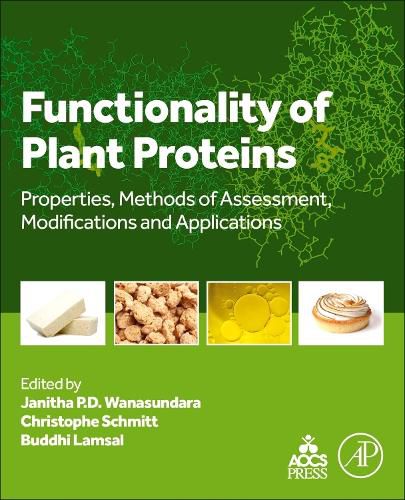Readings Newsletter
Become a Readings Member to make your shopping experience even easier.
Sign in or sign up for free!
You’re not far away from qualifying for FREE standard shipping within Australia
You’ve qualified for FREE standard shipping within Australia
The cart is loading…






Functionality of Food Proteins: Mechanisms, Modifications, Methods of Assessment and Applications provides researchers and users of plant-based proteins with the latest developments on their functionality at the molecular and ingredient level, and in food applications. The book discusses the biological, chemical and physical principles behind the techno-functional and nutritional properties of proteins, existing methods of functionality assessment, and protein modification for functional enhancement. With market demand for protein ingredients, several lesser known sources are being utilized to develop new protein ingredients and products, with some intended to replace, partially or wholly, traditional proteins such as egg, milk, meat, soy and vital gluten.
Depending on the source and processing into ingredients, the ability of these proteins to satisfy techno-functional and nutritional requirements in the final food product may differ. Science-based knowledge is needed in the area of protein functionality for making decisions along the value chain, from production on the land to processing and formulation.
$9.00 standard shipping within Australia
FREE standard shipping within Australia for orders over $100.00
Express & International shipping calculated at checkout
Functionality of Food Proteins: Mechanisms, Modifications, Methods of Assessment and Applications provides researchers and users of plant-based proteins with the latest developments on their functionality at the molecular and ingredient level, and in food applications. The book discusses the biological, chemical and physical principles behind the techno-functional and nutritional properties of proteins, existing methods of functionality assessment, and protein modification for functional enhancement. With market demand for protein ingredients, several lesser known sources are being utilized to develop new protein ingredients and products, with some intended to replace, partially or wholly, traditional proteins such as egg, milk, meat, soy and vital gluten.
Depending on the source and processing into ingredients, the ability of these proteins to satisfy techno-functional and nutritional requirements in the final food product may differ. Science-based knowledge is needed in the area of protein functionality for making decisions along the value chain, from production on the land to processing and formulation.